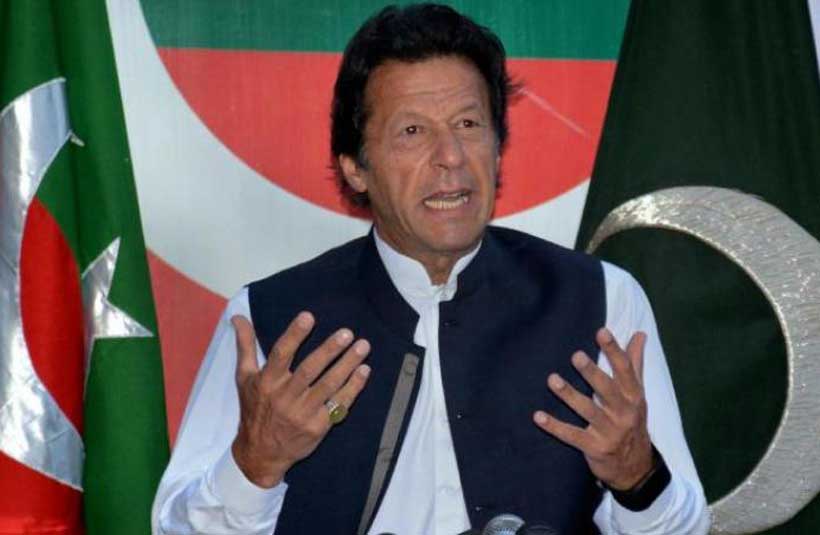The shameful and unprecedented political drama that has been witnessed in Pakistan in the last few days, do probably have no annals in the world history. A supposedly democratic country Pakistan has always been dependent on two As, Army and Allah, to run any government since its incepetion in 1947. However, with Imran Khan taking the centre stage of Pakistani politics, a spectre of complete uncertainity took over the country and nobody inside or beyond, seemed to have a fair idea about what was going to happen next.
The prelude to the story begun a few days back. With political circles agog with rumours of Imran Khan-led Pakistan Terek-i-Insaaf (PTI) party losing its legislative majority and government about to fall, the political scene in the ocuntry suddently became very intense. Imran Khan made a very unexpected public announcement on television that if he is forced to resign, he will become more dangerous and take to streets. Then some unverfied media reports proclaimed that he has asked some time from the arbiter of poitical disputes in the country, the patrons in Rawalpindi, the Army to let him complete the Organisation of Islmaic Countries (OIC) conference in Islamabad and then he will resign.
Meanwhile the no-confidence motion was submitted in the National Assembly and the Speaker, in a highly partisan ruling made sure that the legislative process gets delayed considerably while ruling PTI and its leaders get ample time to marshal resources and bring back dissdents to own camp, by whatever possible means. The former PM Imran Khan and his top aides, all continued to send conflicting signals, from being in complete control of the situation and stability of the government to wilnessing to face hustings at any time and so on. For a while, there was total confusion and political instability continued to hit the economy, diplomacy and political standing of Pakistan across the world.
And in one of the biazzarest and unheard of situations, the then Pakistan PM in collusion with the Speaker and Deputy Speaker of the National Assembly, stalled the voting on the no-confidence motion, citing a ‘foreign conspiracy.’ The alleged conspiracy talked of open threats, intimidation by a foreign diplomat (tuned out to be a US official) trying to dislodge an elected democratic government though most believe that the Khan governmnet actually was selected and set up by the powerful Pakistan army.
Though the credibility of the alleged foreign threat to topple the government remains questionable, the manner in which Imran tried to save his chair till the very last moment even after an adverse unanimous ruling by the Pakistan Supreme Court, speaks of volumes about the unnurtured democratic roots in the country. That the judiciary took almost three days to come to a decision, suggests that even the supposed democartic institutions in the country continue to function under political and establishment’s (read army’s) pressure. The Election Commissions’s fluctuating stance from being able to hold elections within three months initially and later on not before five months, also is indicative of the deep malaise afflicting institutions in the Pakistani state and society.
However, honours for relegating the whatever status left of Pakistan’s democracy before the world to a naught, undoubtedly goes to Imran Khan. The way Khan and the Chief of Army Staff General Bazwa used persona and office of the President, Speaker and Deputy Speaker of the National Assembly, cabinet, political workers/supporters, judiciary, Election Commission and the Pakistan Army, clearly brings out the inherent foundational faultlines in the state of democracy in the country.
Various reports suggest that Khan used the President, Speaker and Deputy Speaker virtually as puppets in the entire sordid drama that continued for almost three weeks in Islamabad. Reportedly, the Chief of Army Staff General Bazwa furious with Khan’s attempts to sack and replace him with his favourite Lt General Faiz Hameed, assulted Khan in his residence and almost blackmailed him with jail term if he refused to comply with his dictates. The manner in which the Supreme Court of Pakistan, Election Commission and entire state apparatus came down to knees in executing General Bazwa’s orders is evident that GHQ, Rawalpindi continues to rule the roost, directly or otherwise.
The announcement of a retired judge as caretaker PM by Imran Khan and his non-existent role in the political drama unfolded, makes the situation even more murkier. Pakistan currently depicts the glommy democratic credentials of a nation where a sitting President, Speaker and Deputy Speaker explicitly talk of their loyalty to the PM and subverting the constitution. The serving Chief of Army Genral Bazwa is on a three-year extension against rules and his orders force the judiciary and Election Commission to get into the act in midnight. Imran Khan pleading to the army for his continuation as the PM till an early elections and using the bogey of US interference to promote his political ends while playing havov with diplomatic principles and putting country’s interests in pepetual danger are simply unfathomable. The supposedly free media further remains careful not to report anything unpleasant to the army. All in all, a situation highly apt to be termed as the country’s maturing into a banana democracy in the 75th year of its inception.


